新目标英语八年级(上册)重点短语及句型(2)
新目标英语八年级上册第一单元重点词汇、句型和语法
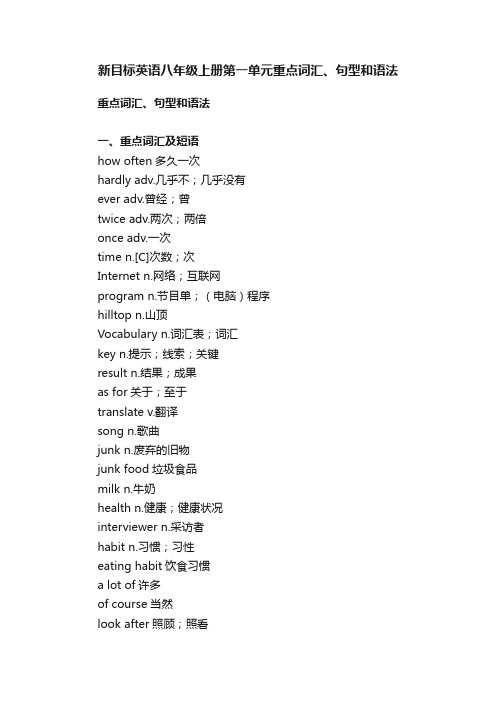
新目标英语八年级上册第一单元重点词汇、句型和语法重点词汇、句型和语法一、重点词汇及短语how often多久一次hardly adv.几乎不;几乎没有ever adv.曾经;曾twice adv.两次;两倍once adv.一次time n.[C]次数;次Internet n.网络;互联网program n.节目单;(电脑)程序hilltop n.山顶Vocabulary n.词汇表;词汇key n.提示;线索;关键result n.结果;成果as for关于;至于translate v.翻译song n.歌曲junk n.废弃的旧物junk food垃圾食品milk n.牛奶health n.健康;健康状况interviewer n.采访者habit n.习惯;习性eating habit饮食习惯a lot of许多of course当然look after照顾;照看difference n.不同;差异;区别make a difference使得结果不同;有重要性grade n.分数;年级;成绩unhealthy adj.不健康的;不益健康的yuck int.(表示反感、厌恶等)although=though conj.虽然;即使;纵然do表强调(位于实义动词前)skateboarding n.滑雪板运动start with以……开始二、重点句型和交际用语1.How often do you…?2.What do you usually do on weekends? I usually play soccer.What do they do on weekends? They often go to the movies.What does he do on weekends? He sometimes watches TV.How often do you shop? I shop once a month.How often does Chung watch TV? He watches TV twice a week.三、重要语法一般现在时的陈述句、特殊疑问句及其回答1.Some students do homework three or four times a week.2.A:How often do you watch TV?B:Twice a week.3.A:What does she do on weekends?B:She often goes to the movies.。
人教新目标八年级英语上册重难点知识点归纳
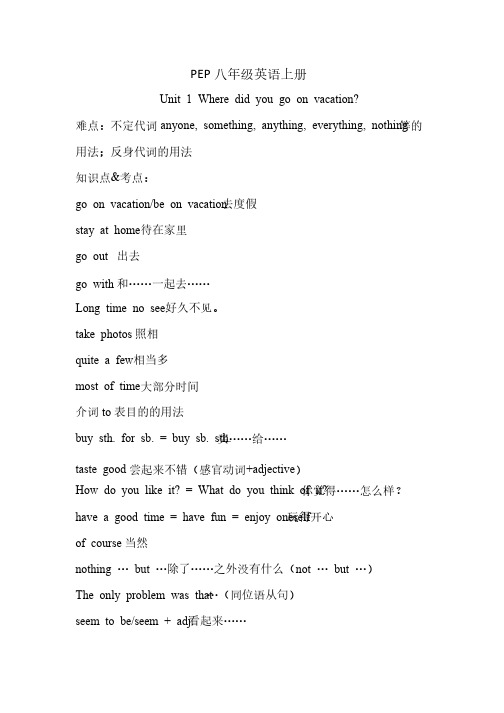
PEP八年级英语上册八年级英语上册Unit 1 Where did you go on vacation? 难点:不定代词anyone, something, anything, everything, nothing等的用法;反身代词的用法用法;反身代词的用法知识点&考点:考点:go on vacation/be on vacation 去度假去度假stay at home 待在家里待在家里待在家里go out 出去出去go with 和……一起去……和……一起去……Long time no see. 好久不见。
好久不见。
take photos 照相照相quite a few 相当多相当多相当多most of time 大部分时间大部分时间大部分时间表目的的用法介词to表目的的用法buy sth. for sb. = buy sb. sth. 买……给……买……给……taste good 尝起来不错(感官动词+adjective)How do you like it? = What do you think of it? 你觉得……怎么样?你觉得……怎么样?have a good time = have fun = enjoy oneself玩得开心玩得开心of course 当然当然nothing …but …除了……之外没有什么(not …but …)…)The only problem was that …(同位语从句)…(同位语从句)seem to be/seem + adj. 看起来……看起来……keep a diary 记日记记日记记日记 + at + 小地点小地点小地点arrive + in + 大地点大地点大地点 decide to do 决定做某事决定做某事决定做某事 try doing sth. 尝试做某事尝试做某事尝试做某事 try to do sth. 尽力做某事尽力做某事feel like 感觉到感觉到 feel like + n./ v-ing 想要……想要……ride … to …骑……到………骑……到……许多的:a lot of + 可数名词可数名词 lots of + 可数可数or 不可数名词不可数名词 I wonder that …我想知道………我想知道………我想知道…… in the past 在过去在过去在过去 enjoy doing sth. 享受做某事享受做某事享受做某事 walk around 到处逛逛到处逛逛感叹句:What + 冠词冠词 + adj. + n. + (it is) = How + adj. + 冠词冠词 + n. + (it is) start start doing doing doing sth. sth. 开始做某事开始做某事 stop stop doing doing doing sth. sth. 停止做某事停止做某事 finish finish doing doing sth. 结束做某事结束做某事because & so (不可同用)(不可同用)(不可同用) wait for …等待………等待……because of + n. a little/ a few 一些(两者的区别,以及与little/few 的区别)的区别) enough + n. / adj. + enough as + adj./adv. + as 和……一样……和……一样……one bowl of …一碗………一碗……along the way 沿着这条路沿着这条路沿着这条路 时间段+ later = after + 时间段……之后时间段……之后other, others, the other, the others, another on trip 在旅途中在旅途中find out 找到,找出找到,找出 / find 寻找寻找 / look for 寻找寻找寻找 so + adj. + that + 从句如此……以致……从句如此……以致……tell sb. (not) to do sth. 告诉某人(不要)做某事告诉某人(不要)做某事keep doing sth. / go on doing sth. 继续做某事继续做某事keep sth. + adj. 使……保持……状态使……保持……状态up and down (人)来来往往;(人)来来往往;(物)上上下下(物)上上下下in excitement = excitedly 兴奋地兴奋地come up / come out / come on / come in forget to do sth. 忘记做某事忘记做某事 forget doing sth. 忘记做过某事忘记做过某事忘记做过某事 like / dislike + n. / v-ing 喜欢/不喜欢某物/做某事做某事something + adj. ……的事情……的事情……的事情 Why not + v. = Why don ’t you + v. 为什么不……呢?为什么不……呢?Unit 2 How often do you exercise? 重点:1. How often 句型的运用;2. 2. 六个频度副词六个频度副词never, hardly ever, sometimes, sometimes, often, often, often, usually, usually, usually, always always 的差异、理解及使用;3. 频率数词once, twice 等的认识和运用;4. 一般现在时不同人称谓语形式的变化及一般疑问句的问答。
八年级英语上册 Unit 2 How often do you exercise讲义+习题 (新版)人教新目标版
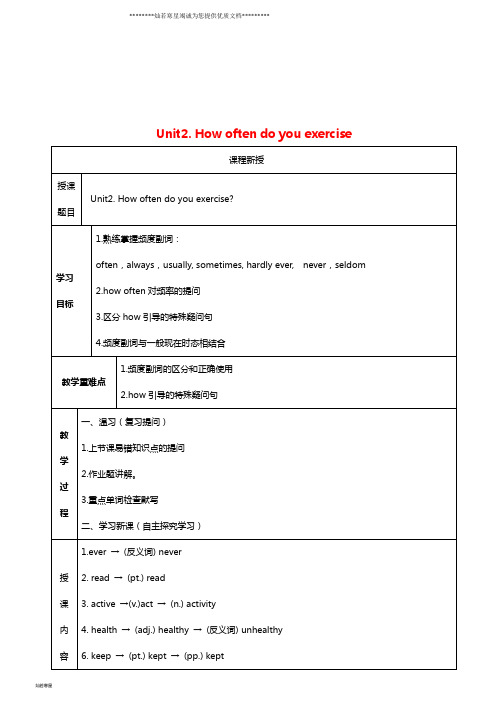
Unit2. How often do you exercise13. at least 至少,不少于14. stay up late/go to bed early15.exercise做动词时,可作及物动词,也可作不及物动词。
例如:She exercises two or three times a week.她一周锻炼两三次。
She exercises the dog every day.每天她都遛狗。
【拓展】exercise作名词时,意为“锻炼;运动”时是不可数名词,意为“体操;练习”时是可数名词。
例如:I should eat less food and take more exercise. 我应该少吃饭,多锻炼。
We do morning exercise every morning.我们每天早上都晨练。
1. junk food 垃圾食品(不可数)2. drink milk 喝牛奶3. three or /to four times a week 一周三到四次4. eat fruit 吃水果5. want 用法A.want( sb.) to do sth. 想要某人做某事6. be good/bad for 对……有好处/坏处7. go camping in the country 去乡下露营8. play sports 做运动=do sports9. one to three times a week 一周一至三次10. such as 例如(与for example的区别)11. fifteen percent of our students 我们百分之十五的学生12. go to the dentist 去看牙医13. more than 多于14. less than 少于15.in one’s free time16.not….at all重点句子It is healthy for the mind and the body.重点句型It is+adj. (for sb.) To do sth.它对于大脑和身体是健康的。
【人教版新目标】英语八年级上册Unit2单元教案
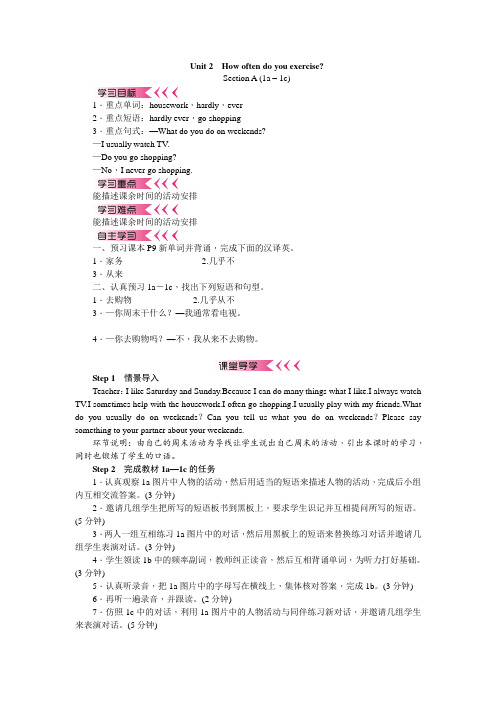
Unit 2How often do you exercise?Section A (1a-1c)1.重点单词:housework,hardly,ever2.重点短语:hardly ever,go shopping3.重点句式:—What do you do on weekends?—I usually watch TV.—Do you go shopping?—No,I never go shopping.能描述课余时间的活动安排能描述课余时间的活动安排一、预习课本P9新单词并背诵,完成下面的汉译英。
1.家务____________ 2.几乎不____________3.从来____________二、认真预习1a-1c,找出下列短语和句型。
1.去购物____________ 2.几乎从不____________3.—你周末干什么?—我通常看电视。
________________________________________________________________________ 4.—你去购物吗?—不,我从来不去购物。
________________________________________________________________________Step 1情景导入Teacher:I like Saturday and Sunday.Because I can do many things what I like.I always watch TV.I sometimes help with the housework.I often go shopping.I usually play with my friends.What do you usually do on weekends?Can you tell us what you do on weekends?Please say something to your partner about your weekends.环节说明:由自己的周末活动为导线让学生说出自己周末的活动,引出本课时的学习,同时也锻炼了学生的口语。
八年级英语上册 unit 1 where did you go on vacation(短语+句型+练习)(新版)人教新目标版
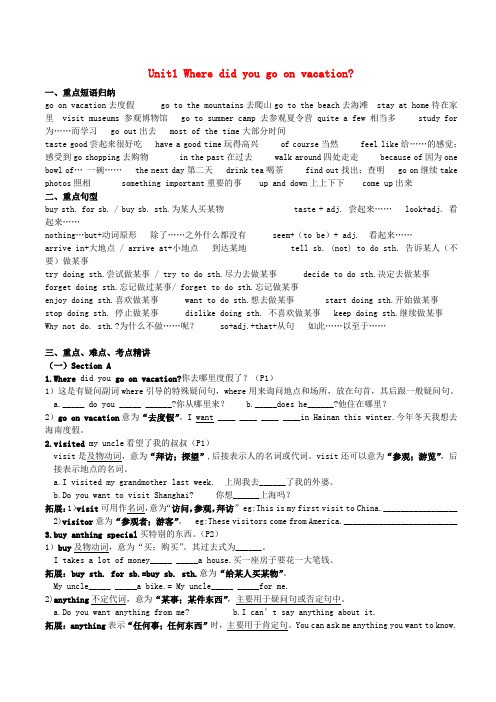
Unit1 Where did you go on vacation?一、重点短语归纳go on vacation去度假 go to the mountains去爬山go to the beach去海滩 stay at home待在家里 visit museums 参观博物馆 go to summer camp去参观夏令营quite a few相当多 study for 为……而学习 go out出去 most of the time大部分时间taste good尝起来很好吃 have a good time玩得高兴 of course当然 feel like给……的感觉;感受到go shopping去购物 in the past在过去 walk around四处走走 because of因为one bowl of…一碗…… the next day第二天 drink tea喝茶 find out找出;查明 go on继续take photos照相 something important重要的事 up and down上上下下 come up出来二、重点句型buy sth. for sb. / buy sb. sth.为某人买某物 taste + adj. 尝起来…… look+adj. 看起来……nothing…but+动词原形除了……之外什么都没有 seem+(to be)+ adj. 看起来……arrive in+大地点 / arrive at+小地点到达某地 tell sb. (not) to do sth. 告诉某人(不要)做某事try doing sth.尝试做某事 / try to do sth.尽力去做某事 decide to do sth.决定去做某事forget doing sth.忘记做过某事/ forget to do sth.忘记做某事enjoy doing sth.喜欢做某事 want to do sth.想去做某事 start doing sth.开始做某事stop doing sth. 停止做某事 dislike doing sth. 不喜欢做某事 keep doing sth.继续做某事Why not do. sth.?为什么不做……呢? so+adj.+that+从句如此……以至于……三、重点、难点、考点精讲(一)Section A1.Where did you go on vacation?你去哪里度假了?(P1)1)这是有疑问副词where引导的特殊疑问句,where用来询问地点和场所,放在句首,其后跟一般疑问句。
2020年中考新目标版英语教材梳理八年级(上册)Units1-2

3.point(n.)得分;重点,要点;看法; 目的 (v.)意图指向;瞄准,对准 如:There is no point in getting angry. 发火是没有用的。 He pointed the gun at her head. 他举枪对准了她的头。
4.once(adv.)一次;曾经 (conj.)一旦;一……就…… 如:This book was famous once, but nobody reads it today. 这本书曾名噪一时,但现在却无人问津。 Once you set a goal, you should try to achieve it. 你一旦制定目标,就应该努力去实现。
第七讲 八年级(上册)Units 1-2
注:表格中标★部分为词汇相关短语。 词汇攻关
1.wonder(v.& n.)→ wwoonnddeerrffuull (adj.)精彩的,绝妙的;极好的 2.bore(v.)→ bboorreedd (adj.)厌烦的;厌倦的;烦闷的 ★ bbee bboorreedd wwiitthh 对……感到厌倦 → bboorriinngg (adj.)无聊的;令人厌倦的
Hale Waihona Puke 重点句型 1.I wonder what life was like here in the past. 我想知道这里过去的生活是什么样子的。 2.Because of the bad weather, we couldn't see anything below. 因为恶劣的天气,底下的东西我们什么都看不见。
6.wait(v.)→ wwaaiitteerr (n.)服务员 → wwaaiittrreessss (n.)女服务员 ★ wwaaititfoforr 等待 ★ ccaann''ttwwaaitittotoddoossthth.. 迫不及待做某事 7.hunger(n.)→ hhuunnggrryy (adj.)饥饿的
人教新目标英语八年级上册unit1-Unit4单元重点知识复习
人教新目标英语八年级上册unit1-Unit4单元重点知识复习Unit 1: Grammar - "XXX"1.n of Compound Indefinite Pronouns:XXX: something。
everything。
anything。
nothingReferring to People: XXX。
everyone。
anyone。
no one。
XXX。
everybody。
anybody。
nobodyage of Compound Indefinite Pronouns:① anything。
anyone。
anybody are often used in negative XXX。
when anything means "any matter," and anyone。
anybody means "anyone," they are used in affirmative sentences.I don't want to talk to anyone now。
(Negative sentence)Can I ask anyone who knows the answer。
(General n)XXX(Affirmative sentence)What would you like to drink。
Anything is ok。
(Affirmative sentence)② XXX subjects。
the verb must be in singular form.Everyone here is from China.XXX.③ Adjectives XXX.Would you like to buy anything special?Can XXX interesting?④ When making requests。
人教新目标八年级英语上册思维导图课堂笔记Unit 2 How often do you exercise
Unit 2 How often do you exercise?2013版人教新目标八年级英语上册思维导图课堂笔记1. housework n. 家务劳动;家务事We should help our mothers do the housework. 我们应该帮助妈妈做家务。
不可数名词do the housework做家务homework家庭作业homework家庭作业workhouse劳动救济所schoolwork课堂作业workplace工作场所workhorse吃苦耐劳的人workbook练习册2. hardly adv. 几乎不;几乎没有There’s hardly any tea left. 没有剩下什么茶。
表否定,改反意疑问句时,疑问部分用肯定形式This boy hardly eats junk food,does he?=almost nothardadv.努力地;艰难地adj.困难的3. ever adv. 在任何时候;从来;曾经Don’t you ever get tired? 难道你从来不累吗?hardly ever几乎从不ever since自从常用于疑问句和否定句中neveradv.从不,从来没有4. once adv. 一次,曾经The farmers here sow once a year. 这里的农民一年播种一次。
once a week一周一次意为“曾经”时,常与过去时连用。
位于行为动词之前、系动词之后。
He once lived in Hangzhou.This book was famous once,but now nobody reads it.5. twice adv. 两次,两倍I go shopping twice a week. 我一个星期购物两次。
Cats sleep twice as much as people. 猫睡觉的时间是人的两倍。
八年级英语上册Unit2Howoftendoyouexercise课件(新版)人教新目标版
swims very well.
A. exercise
B. exercises
C. do exercise D. does exercises
要点梳理
(
A
)2. Tom does eye _____ in the classroom
after doing math _____ for half an hour.
3. How come?
为什么呢?/怎么会呢? ___________________________________________
4. What kind of dance are you learning?
你正在学习哪种舞蹈? ___________________________________________
1. What do you usually do on weekends?
你周末通常做什么? ___________________________________________
课前导学 2. What’s your favorite program? 你最喜欢的节目是什么? ___________________________________________
5. Oh, I have to play tennis with my friends.
哦,我得跟朋友们打网球。 ___________________________________________
课前导学 单元语法 频率副词的使用以及what与how often 句型的提
问、回答;一般现在时态的用法
课前导学 maybe 8. ___________ adv. 大概;或许;可能 least 9. ___________ adv. 最小;最少 adj. & pron. 最小的;最少的
最新人教新目标八年级上册英语Un...
最新⼈教新⽬标⼋年级上册英语Un...第5单元Do you want to watch a game show?Section A 单词news n.新闻节⽬;新闻mind v.介意;对(某事)烦恼educational adj.教育的;有教育意义的stand v.忍受;站⽴plan v.&n.打算;计划hope v.&n.希望discussion n.讨论;商量happen v.发⽣;出现expect v.预料;期待joke n.笑话;玩笑sitcom n.情景喜剧comedy n.喜剧;喜剧⽚短语think of 认为learn from 从……中获得find out 查明;弄清talk show 访谈节⽬soap opera 肥皂剧go on 发⽣hope to do希望做……plan to do计划做……look like 看起来像……expect to do期待做……around the world 全世界one day 有⼀天have a discussion about 就……讨论句型1.—What do you think of talk shows? 你认为脱⼝秀怎么样?—I don’t mind them./I can’t stand them!/I love watching them!我不介意它们。
/我⽆法忍受它们!/我喜欢看它们!2. Because I hope to find out what’s going on around the world. 因为我希望了解世界各处正在发⽣的事。
Section B 单词meaningless adj.毫⽆意义的;意思不明确的action n.⾏动cartoon n.动画⽚;卡通⽚culture n.⽂化;⽂明famous adj.著名的;出名的appear v.出现become v.开始变得;变成rich adj.富有的successful adj.获得成功的;有成就的might modal v.可能;可以main adj.主要的;最重要的reason n.原因;理由common adj.普通的;常见的film n.电影unlucky adj.不幸的;不吉利的lose v.失去;丢失ready adj.愿意的;准备好的simple adj.简单的;易做的army n.陆军;陆军部队girlfriend n.⼥朋友character n.⼈物;⾓⾊character n.⼈物;⾓⾊短语be ready to 愿意(做某事)dress up 装扮;乔装打扮as famous as与……⼀样有名let sb.do sth. 让某⼈做某事such as例如 a pair of⼀双;⼀对come out出版;发⾏try one’s best to do sth. 尽⼒做某事句型1. In his early films, Mickey was unlucky and had many problems such as losing his house or girlfriend, Minnie. 在他的早期影⽚⾥,⽶⽼⿏是不幸的,他⾯临许多问题,⽐如失去⾃⼰的房⼦和⼥朋友⽶妮。
- 1、下载文档前请自行甄别文档内容的完整性,平台不提供额外的编辑、内容补充、找答案等附加服务。
- 2、"仅部分预览"的文档,不可在线预览部分如存在完整性等问题,可反馈申请退款(可完整预览的文档不适用该条件!)。
- 3、如文档侵犯您的权益,请联系客服反馈,我们会尽快为您处理(人工客服工作时间:9:00-18:30)。
立身以立学为先,立学以读书为本八年级英语第七单元I.应掌握的词组:1. make a banana milk shake 制作香蕉奶昔2.peel the bananas 剥香蕉3. cut up the bananas切碎香蕉4. pour the milk in the blender 将牛奶倒入搅拌器5. turn on the blender 打开搅拌器电源6. put the yogurt in the blender 将酸奶放入搅拌器7.turn off 关上, turn up旋大(灯火等),开大(煤气等)调高(声音等),turn down 把(灯火、电器等)关小一点8. how much relish多少调料9. one teaspoon of relish 一茶匙调料10. make fruit salad 制作水果沙拉11. two pieces of bread 两片面包12. mix it all up 将它们混合在一起13. takes turns doing sth, take turns to do sth. =do sth. in turns 轮流做某事14. turkey slices 火鸡肉片, a slice of bread一片面包15. slices of duck 烤鸭片16. roll pancake 卷上薄饼17. make faces 作鬼脸,make friends with 与……交朋友,make a noise吵闹, make mistakes犯错误, make the bed整理床铺, make one’s way to往…走去, make room for给…腾出地方18. it’s easy to do sth. 做某事容易,it’s hard (difficult) to do sth.做某事难,It’s necessary to do sth.做某事必要19. put sth, in order 将某些东西按顺序排列20. a recipe for ……的烹调方法, ……的菜谱II.应掌握的句子:1.How do you make a banana milk shake? 如何制作香蕉奶昔?翻译:如何制作水果沙拉?
他们是怎样制作爆米花的?工人们正在制造机器。妈妈常给我们做蛋糕。2.Describe a process and follow instructions. 描述过程,按说明做。翻译:我的欢乐是无法用语言来描述的。
你能描述那次事故吗?你可以描述你的学校生活。我无法对你描述我的感受。你能描述一下她的长相吗?设法描述一下那天发生的事。3.Pour the milk into the blender.把牛奶倒入果汁机。翻译:请倒一杯茶。要不要我给你倒一杯水?4.How many bananas do we need? 我们需要多少个香蕉?翻译:桌子上有多少书?
桌子上有多少杯茶?那只袋子里有多少大米?你有多少钱?5.Then compare lists with another student. 然后和另一个学生的清单进行比较。翻译:我正在把这两个单词进行比较。他开始把自己和其他的学生比一比。立身以立学为先,立学以读书为本6.I need some help.我需要一些帮助。翻译:他需要一枝钢笔。我口渴了,我需要一杯茶。他需要早些到达那里。你不必为他的学习担心。他需要马上到这里来吗?我们没有必要做这件事。那位老人需要帮助。患难朋友才是真正的朋友。III.用所给词的适当形式填空:1. Check you have all the (ingredient). 2. This his (finally) exam. 3. There’s no need (worry) about his study. 4. I like Chinese tea (with) anything in it. 5. Listen! Who (sing) in the next room? 6. Most of the (Australia) speak English, too. 7. The busiest (shop) center is on Green Road. 8. They need another (pair) of shoes. 9. Write a sentence with the words (give). 10. He wants six (mushroom) for the sandwich. IV. 根据要求改写句子:1.There six bags of rice in the room. (就画线部分提问)
2.They succeeded finally. (同义句) they succeeded. 3.Mary needs another three pens. (同义句). Mary needs pens. 4.If you have nothing to do now, please put the rice into the basket. (同义句) If you now, please put the rice into the basket. 5.Susan wants six bottles of milk. (就画线部分提问)。
6.Let’s make a birthday cake. (同义句). making a birthday cake? V.翻译:1.我们需要多少美乃滋?2.我想做水果沙拉?3.下一步,将包米放进爆米花机。4.切碎这个苹果并把它放进碗里。5.你需要在面包上放两茶匙糖。6.请将所有的东西混合在一起。7.比尔将番茄酱放到面包上。8.然后,把这些句子按顺序排列。9.山姆刚才吃了两片面包。立身以立学为先,立学以读书为本10.请将热水倒进搅拌器。八年级英语第八单元I. 应掌握的词组:1. talk about 谈论,talk over谈论2. give a talk 作报告3. have a talk to (with) sb.与某人谈话4. go to the beach去海滩5.have ice cream吃冰淇淋6.go to the zoo去动物园7.go to the aquarium去水族馆8. hang out with one’s friends和朋友闲逛9.take photos=take a photo =take pictures=take a picture照相10. buy a souvenir买纪念品11. have pizza吃比萨饼12. a famous actor著名的演员13.get one’s autograph得到了某人的亲笔签名14. win a prize赢得奖品(奖项)15. at the aquarium 在水族馆16.have a great time 玩得高兴,过得愉快17.on the school trip在学校的旅游18.Blue Water Aquarium蓝色水族馆19.the Visitors’ Center游客中心20.a dolphin show海豚表演21.after that 后来22.at the end of…在……结束的时候,在……的尽头23.the Gift Shop礼品店24.at the beginning of…在……开始的时候25. a terrible school trip 糟糕的学校旅行26. that sounds interesting 那听起来很有趣27.make up a story编一个故事28. go for a drive 开车兜风30.in the rain在雨中,in the dark在黑暗中,in the sun在阳光下,in the snow在雪中31.take notes of=write down =copy down 写下,记下32.have fun doing sth.很快乐的做某事33. play computer games打电脑游戏34.for sale 供销售35.see you soon盼望很快见到你36.in one’s opinion据某人看来,某人的观点上看37. win the first prize获得了一等奖38.a famous basketball player 著名的篮球运动员39. in the future在将来,今后40. can’t help doing sth.忍不住做某事41.the story goes that…据说……42. a busy day off 繁忙的假日,in one’s off hours在某人的休息时间,the off season淡季43. none of… ……当中没有一个44. a heavy rain 一阵大雨,a light rain一阵小雨, a fine rain 一阵细雨44. all day=all day long 整天,all night=all night long整夜II. 应掌握的句子:1. How was your school trip? 你的学校旅行怎么样?翻译:今天天气怎么样?前天天气怎么样?你的假日怎么样?和我一起去看电影怎么样?我们准备乘坐公共汽车去武汉旅行。她正在上海出差。(be on business trip)2. Talk about events in the past.谈谈过去的事件。翻译:我非常喜欢和你谈话。
